


Our recent report titled The Bollywood Franchise Report: 2023 lists the top 100 existing and potential Hindi film franchises, based on audience equity (read more here). The top end of the list is dominated by bona fide franchises like Hera Pheri, Drishyam, and Gadar, or by stand-alone films that received wholehearted audience approval upon their release, like 3 Idiots, Jawan, and Uri: The Surgical Strike. But one name stands out in the top 10 (chart below). Not too many would have predicted the high no. 2 rank that Chennai Express, Rohit Shetty’s 2013 Eid release starring Shah Rukh Khan (SRK) and Deepika Padukone, enjoys on this list.
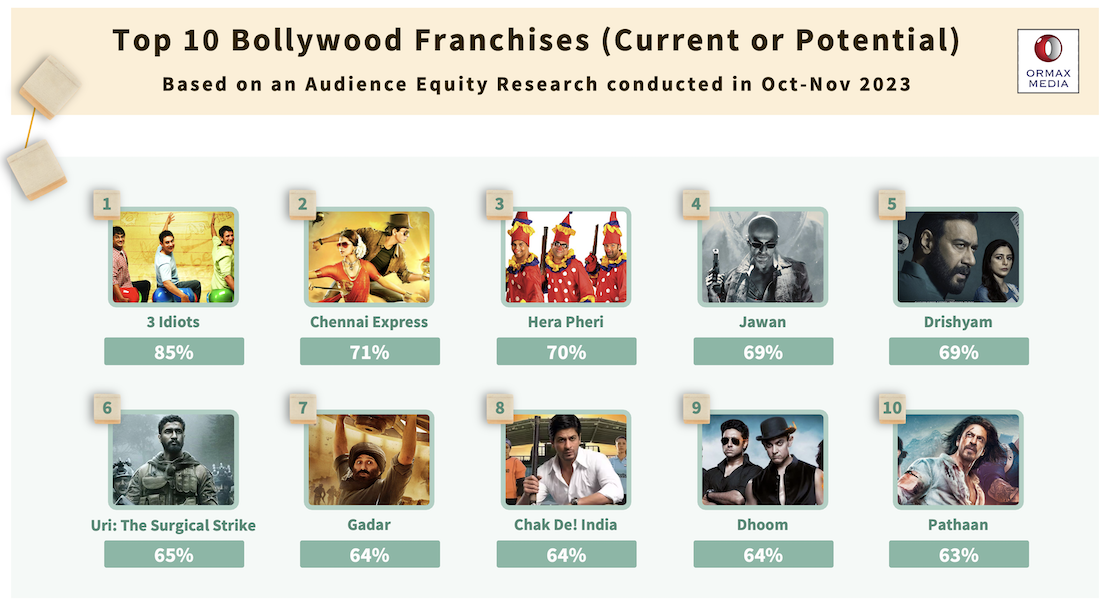
In 2013, Chennai Express became only the second film to cross the ₹30 Cr mark (nett domestic box office) on its first day, after the previous year’s Eid release Ek Tha Tiger. It then went on to become only the second Hindi film to reach the ₹200 Cr mark, more than 3.5 years after 3 Idiots (2009), and became the highest-grossing Hindi film of all time, a record it held for four months, before Dhoom 3 broke it in December 2013. Little did we know that time that it will take SRK another 10 years to hit the ₹200 Cr mark again, a feat he managed thrice over in 2023!
But despite its box office records, Chennai Express wasn’t a universally-liked film of its time. The film received mixed reviews, and its Ormax Power Rating (OPR), a measure of audience likeability, stood at a good, but not exceptional, 60. The chart below has the OPR of the top films from the 2012-2014 period, and we can see that Chennai Express isn't exactly a breakout film on this metric.
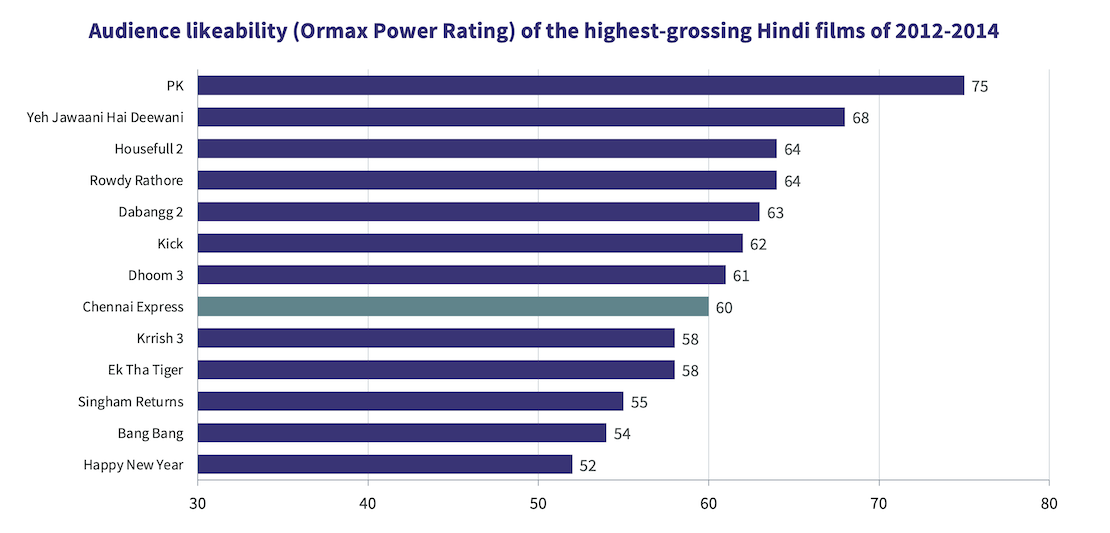
There has been no talk of a sequel over the last decade. Rohit Shetty worked again with SRK in Dilwale (2015), and that film didn’t receive much success, falling short of ₹150 Cr, and well below Sanjay Leela Bhansali’s Bajirao Mastani, which released on the same day. Dilwale’s sub-par performance (its OPR was only 50) put brakes on a promising association between a top director and a top star.
But judging by the results of our franchise equity report, Chennai Express has aged well. One could argue that the film benefits from SRK’s soaring popularity at the time of the research. But Chennai Express features higher on the list compared to the more-recent stand-alone SRK film Jawan, the highest-grossing Hindi film of all time as on date, which suggests there is more than just stardom at play here. I decided to re-watch the film to decode how it has managed to build a legacy, much beyond what anyone would have predicted a decade ago.
Like most Rohit Shetty films, the film relies on inclusive and accessible entertainment, offering set-pieces in Shetty’s two favorite genres, comedy and action. A long and imaginative train sequence sets up the lead characters early in the film, and thereafter, the story relies heavily on their sparkling chemistry, accentuated by the North-South cultural divide, which is the source of comedy, often stereotypical, through the first hour and a half of the film.
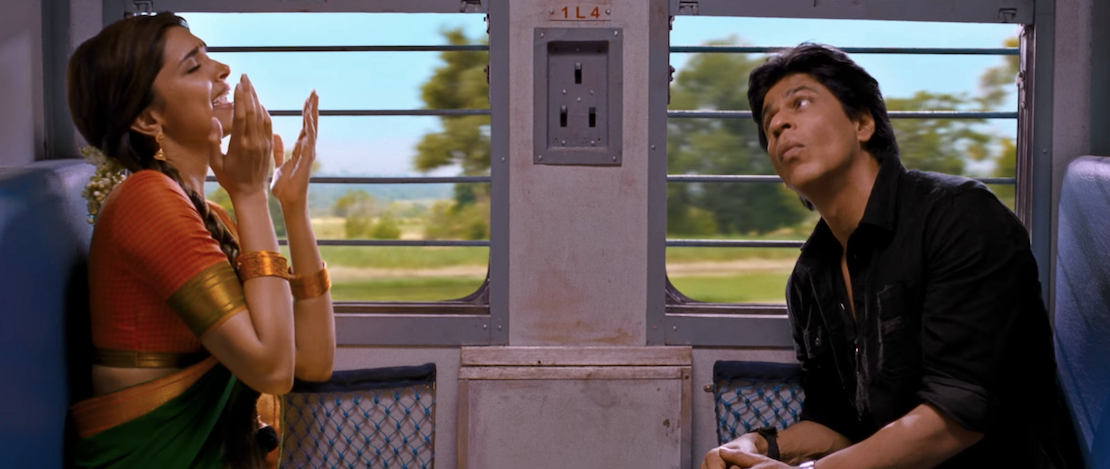
At the time of its release, many reviews criticized the film for using ‘too much Tamil’, and not using subtitles to help viewers understand the Tamil dialogue. This criticism misses the point of the language play in the film. The fact that SRK’s character Rahul cannot understand Tamil is THE source of comedy, and subtitles would kill that idea for those who would read and understand them. Unfortunately, this nuance has been lost in the streaming space too, where all Tamil lines spoken to Rahul are subtitled, instead of the more appropriate “speaks Tamil” caption.
The film is very high on color, and looks rich and vibrant, despite being based in small town and rural settings for most part. There are the signature ‘car flying’ scenes too, which are a part of Shetty’s brand of cinema.
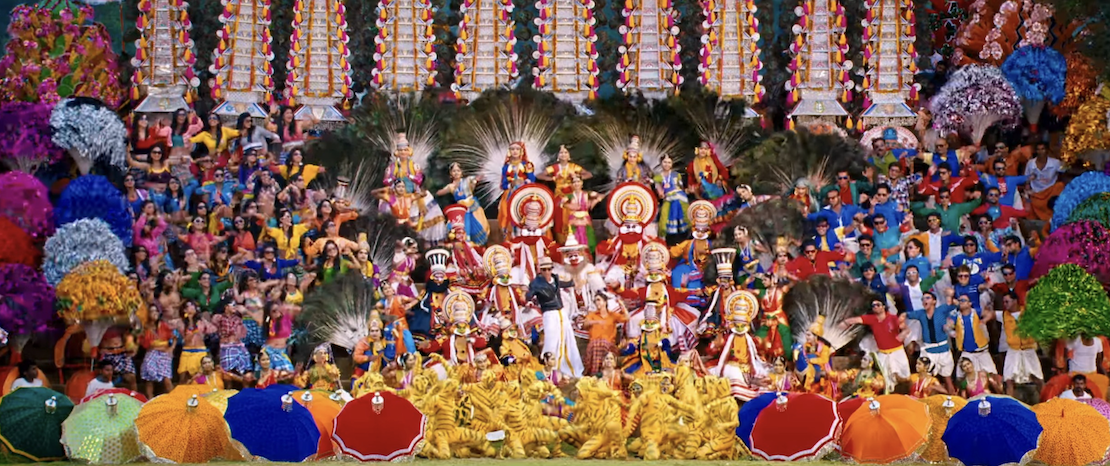
But none of this is still worthy of a second rank on the list. At its best, the film would seem like an entertaining but forgettable fare, or as many audiences would call it, a “one-time watch”. The film's oft-repeated punchline, 'Don't underestimate the power of a common man', falls short of memorability too.
And then, with 45 minutes left in the film, things change!
SRK is the certified king of love stories, and that’s not a genre Rohit Shetty is traditionally associated with. SRK’s subsequent attempts on this genre with other directors (Imtiaz Ali in Jab Harry Met Sejal, and Aanand L. Rai in Zero) were box office failures. But in the last 45 minutes of Chennai Express, Shetty manages an incredible blend between his style and sensibility, and SRK’s romantic persona.
This portion takes off with the temple ritual preceding the song Titli, in which Rahul shows his love for Meenamma (Deepika Padukone’s character) by walking up a long flight of stairs, holding her in his arms. Instantly, he becomes the romantic hero who defined Hindi cinema in the 1990s. The eyes speak, and you buy into the love story. One that's been almost 100 minutes in the making. If you are the kinds who can weep while watching movies, this is potentially the first time Chennai Express extracts a few tears out of you.
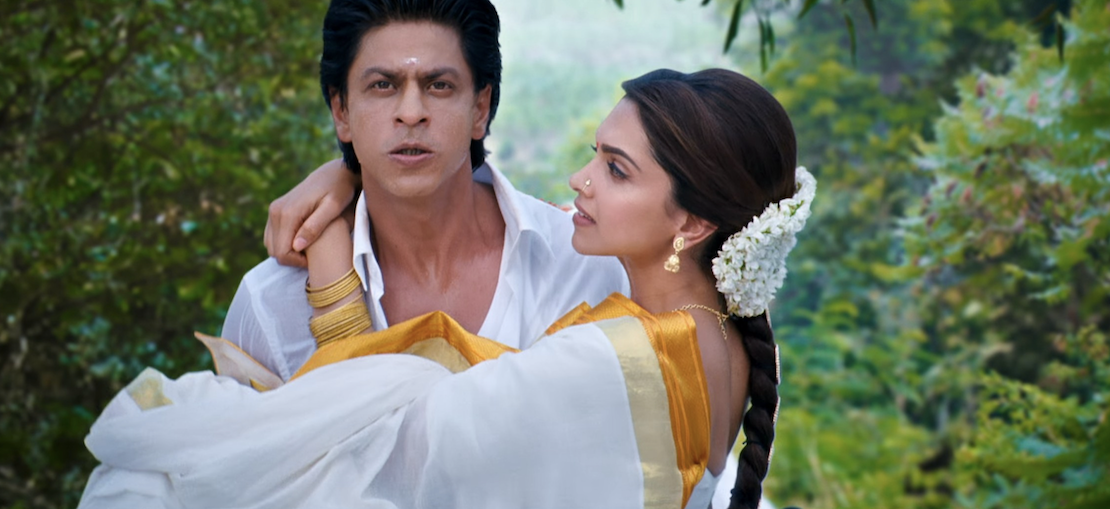
This sequence is then followed by a series of sequences that continue to build on this romance, through two more songs in the next 20 minutes: The frothy and colorful Kashmir Main Tu Kanyakumari, and the more emotional Tera Rastaa Chhodoon Na. Despite the musical treatment, the love is real, felt and understated. The picture below, from the latter song, is a brief 'dream sequence' that allows Shetty to pay homage to SRK's iconic open-arms pose. Shetty also references SRK's most iconic romantic film Dilwale Dulhania Le Jayenge (DDLJ) liberally in Chennai Express, both as a source of comedy and portrayal of Indian family values.
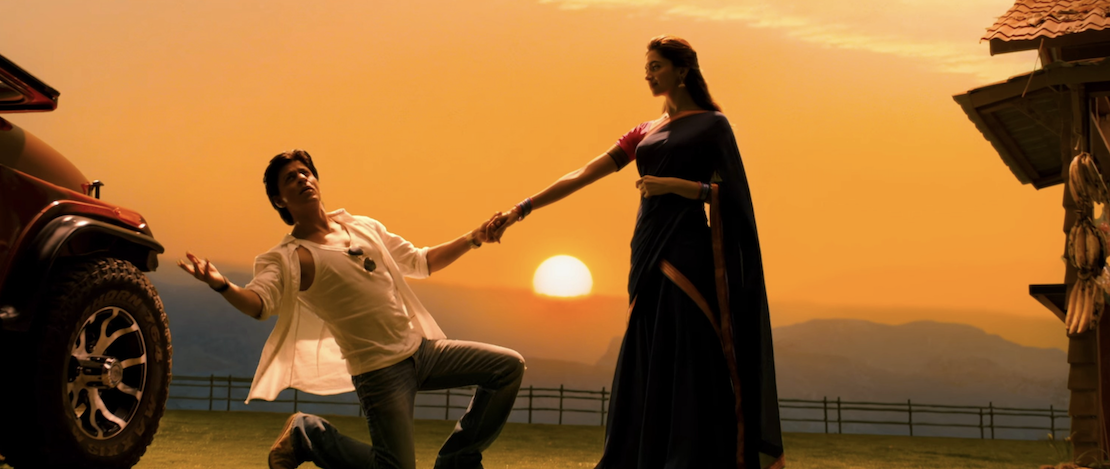
Punctuating these three romantic songs is perhaps the most significant scene of the film, that lends it immense gravitas and heft. Meenamma risks her (and Rahul’s) life to get the urn that has Rahul’s grandfather’s ashes. The urn plays a pivotal role in the film right from the opening sequence. But it’s in this one scene (picture below) that Shetty uses it to communicate love, emotion, and culture, all at one go. Rahul couldn’t care less about whether his grandfather’s dying wish of getting a part of his ashes immersed in Rameswaram is fulfilled. But Meenamma does. And so does the viewer, who begins to root for her, and her love story. Just like they rooted for Rahul and his love story a couple of scenes back on the temple stairway.
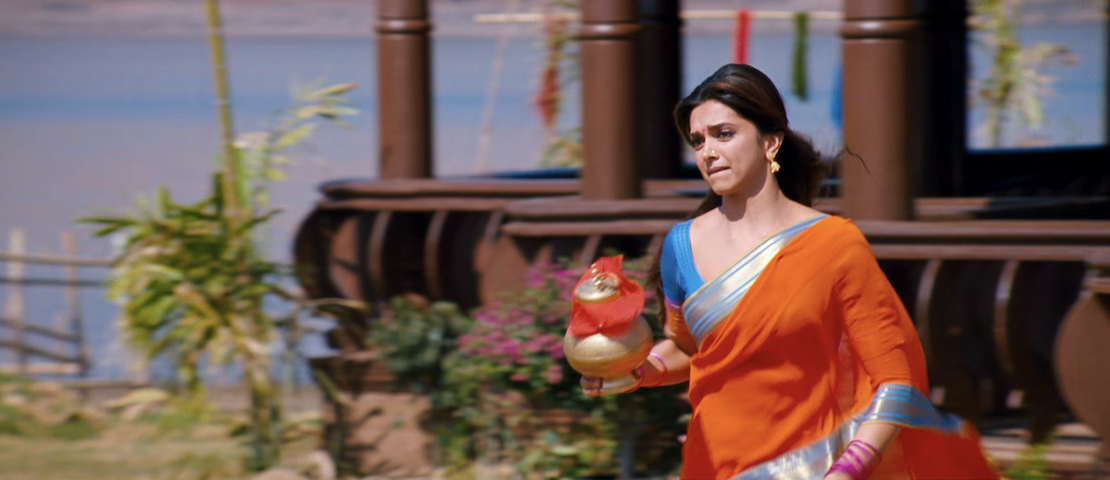
Films that change their trajectory, to become bigger, and very different, than what they seemed originally, are rare finds. Badhaai Ho (2018) is another such film that comes to mind, where a largely light but progressive film becomes deeply meaningful and emotional, even cathartic, with a key scene in which the daadi’s character (played by Surekha Sikri) decides to speak up for her daughter-in-law (played by Neena Gupta), whom she has been taunting through the film, at a family gathering. It’s almost like a switch has been turned on, and the emotions have been dialed up, but ever so organically.
The last 45 minutes of Chennai Express is that kind of film. They elevate a harmless, fun film to a love story that you want to care about. It is this love story (and the associated music) that has aged well. Sometimes, when one sees a film without the noise of its marketing, it seems like a different film altogether. Chennai Express, which had a hyped promotional campaign on the back of songs like Lungi Dance and 1,2,3,4… Get on the Dance Floor, now works best as a love story rooted in Indian culture, which lead protagonists who are funny and relatable in equal parts.
The film may never get a sequel, and that’s not exactly a bad thing. But its legacy could only grow stronger, even as its lead star chooses the action-adventure path in the new phase of his career!
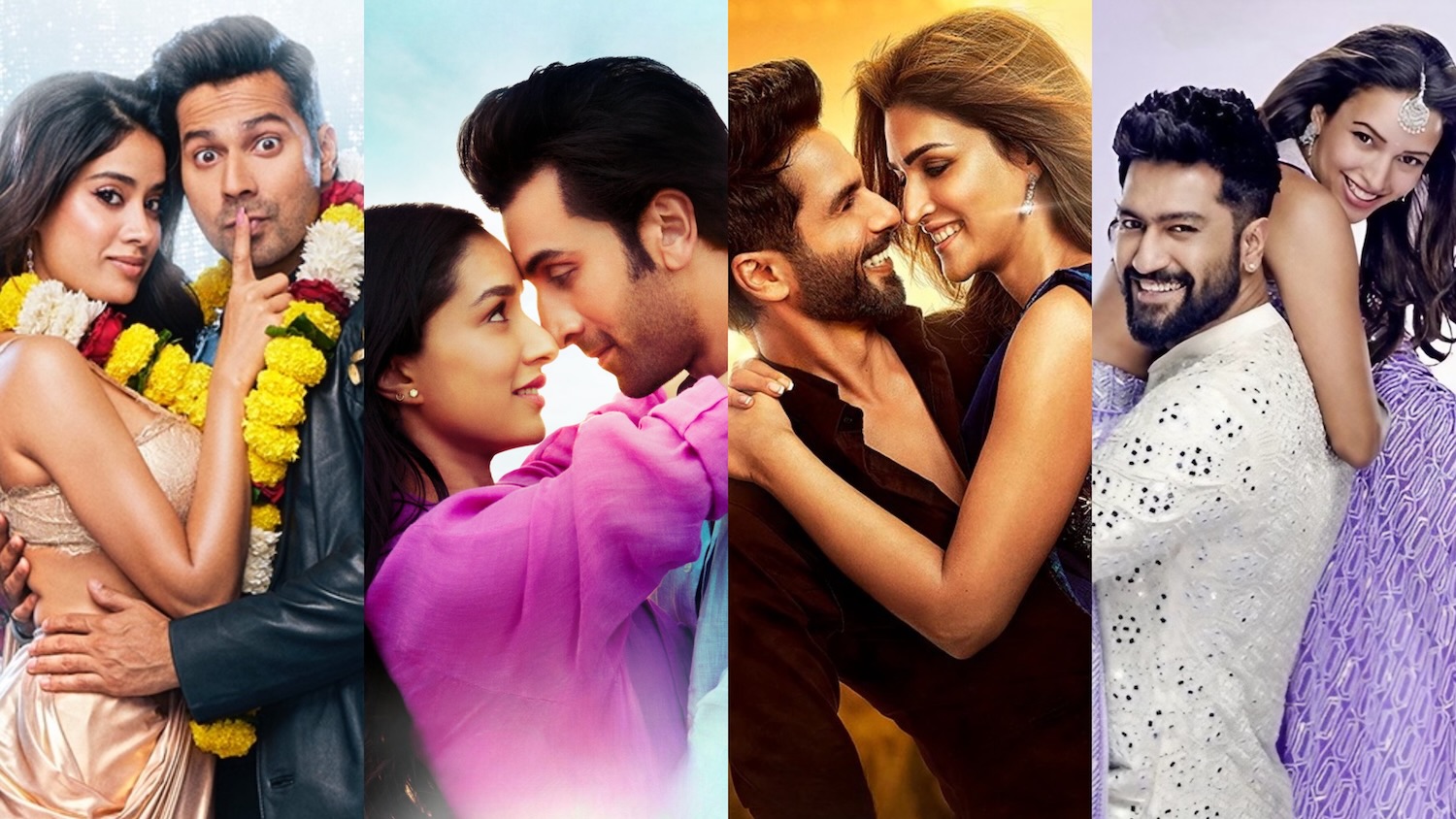
Urban romcoms: The Delhi NCR story
An analysis of why Delhi NCR contributes disproportionately to the box office of urban Hindi romcoms

The Ormax Box Office Report: 2025
Powered by Hindi cinema’s strong comeback, 2025 became the biggest year ever at the Indian box office, with gross collections of ₹13,395 Cr, even as footfalls stayed flat

Introducing Ormax Media Affluence (OMA)
OMA is a new audience classification system designed specifically to measure affluence level of audiences in context of the media & entertainment sector in India
Subscribe to stay updated with our latest insights
We use cookies to improve your experience on this site. To find out more, read our Privacy Policy